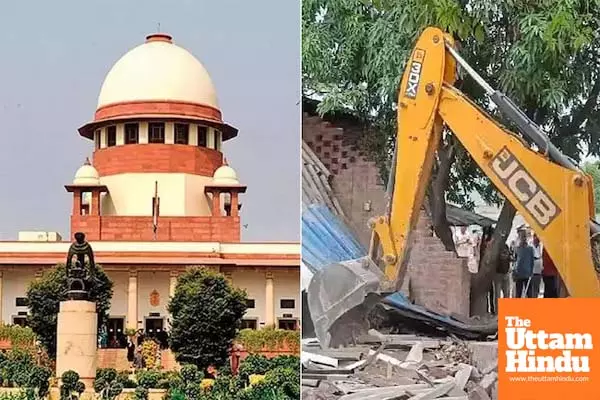Supreme court slams arbitrary bulldozer demolitions, issues strict guidelines

New Delhi (The Uttam Hindu): The Supreme Court on Wednesday strongly criticized the "arbitrary" use of bulldozers to demolish homes, asserting that the executive branch cannot override the judiciary and take punitive actions, such as demolitions, based solely on accusations. The court emphasized that such actions violate the constitutional principle of separation of powers and warned officials against exceeding their authority, saying they would be held accountable for any excesses.
The court was hearing petitions seeking to halt the ongoing "bulldozer" actions against individuals accused of crimes, stressing that demolishing a person's home without proper legal process is not acceptable. The bench, comprising Justices BR Gavai and KV Vishwanathan, noted that it is unconstitutional to demolish homes based on mere accusations, especially when such actions infringe on the rights of the accused.
"How can authorities be allowed to demolish the homes of entire families just because one person is accused of a crime?" the court questioned during the proceedings. It further warned that any officials found abusing their power in such cases would face consequences, including prosecution for contempt of court, and would be held liable for compensation.
The Supreme Court also issued a set of strict guidelines to regulate bulldozer demolitions. The court ordered that no demolition should take place without following these new norms. These include a mandatory 15-day notice period before any demolition, the issuance of a show cause notice, and the creation of a digital portal within three months to track the notices. The portal will include details of the notice, the reasons for the demolition, and the date it was displayed on-site.
Furthermore, the court ruled that the property owner or occupier must be given a personal hearing before demolition, where they can present their case. Officials must assess whether the offence is compoundable or if partial demolition is possible. The court also directed that each notice must clearly explain the necessity of the demolition.
The court emphasized that failure to comply with these guidelines would result in legal consequences for the responsible officials, and they could face prosecution for contempt of court. In a previous interim order, the Supreme Court had directed authorities to halt demolition drives until further notice, stressing the need for due process and accountability.
- Tags
- #Supreme Court
- #Bulldozer Action
- #Demolition Guidelines
- #Separation of Powers
- #Executive Excesses
- #Constitutional Law
- #Accountability
- #Judiciary Oversight
- #Contempt of Court
- #Home Demolition
- #Property Rights
- #Compensation
- #Legal Process
- #Justice BR Gavai
- #Justice KV Vishwanathan
- #Public Safety
- #Judicial Intervention
